Irrigation systems are becoming increasingly prevalent as modern farming practices continue to evolve. In the past, farmers relied solely on rainwater to irrigate their crops. However, as droughts become more frequent and climate change takes effect, the traditional method of relying solely on rainfall is becoming less practical. Hence, the use of agricultural irrigation systems has become a popular alternative to traditional farming practices. But do irrigation systems improve agricultural production? In this blog post, we will explore the answer to this question, how irrigation systems work, and the benefits they offer to farmers.
How Agricultural Irrigation Affects Soil & Harvests
 Irrigation systems play a vital role in the agriculture industry. They ensure that crops have enough water to grow and produce high yields. One of the significant advantages of an irrigation system is that it allows farmers to irrigate their crops more evenly and consistently. With irrigation, the farmer can provide water to crops when they need it, instead of relying solely on rainwater. An irrigation system reduces the amount of water lost through runoff and evaporation, ensuring that all the water reaches the crops.
Irrigation systems play a vital role in the agriculture industry. They ensure that crops have enough water to grow and produce high yields. One of the significant advantages of an irrigation system is that it allows farmers to irrigate their crops more evenly and consistently. With irrigation, the farmer can provide water to crops when they need it, instead of relying solely on rainwater. An irrigation system reduces the amount of water lost through runoff and evaporation, ensuring that all the water reaches the crops.
Types Of Irrigation Systems
There are different types of irrigation systems that a farmer can choose from, depending on the crop they are growing, weather conditions, and the size of their land. These systems include drip irrigation, sprinkler irrigation, flood irrigation, and center pivot irrigation. Each system has its unique benefits and drawbacks. Drip Irrigation is the most efficient, as it delivers water directly to the roots of the plant, minimizing water loss through evaporation and runoff. Sprinkler irrigation is suitable for large areas of land and water-hungry crops. Flood irrigation is ideal for low-lying fields, whereas center-pivot irrigation is perfect for irrigating large fields.
Benefits Of Proper Farming Irrigation
Irrigation systems can also increase the yield and quality of crops. With consistent and even watering, crops can produce more yield, grow faster, and mature more uniformly. Additionally, irrigation systems allow farmers to plant and harvest crops throughout the year, regardless of the weather conditions. This can significantly increase their revenue and improve their financial stability.
Another benefit of irrigation systems is that they can help farmers conserve water. By using only the necessary amount of water, farmers can avoid depleting the water table resources and protect the environment. By reducing water usage, farmers can also save money on their water bills, making their farming operations more cost-effective.
 In conclusion, irrigation systems play a critical role in the agriculture industry by providing crops with consistent water supply, increasing yield and quality, allowing for year-round harvesting, and minimizing water wastage. The benefits of these systems make them a worthwhile investment for farmers looking to maximize their production and profits. Although the initial cost of installation may be high, the long-term benefits of owning a reliable irrigation system most definitely outweigh the negatives. Ultimately, irrigation systems are a essential tool for modern-day farming practices and are essential for maintaining sustainable agriculture.
In conclusion, irrigation systems play a critical role in the agriculture industry by providing crops with consistent water supply, increasing yield and quality, allowing for year-round harvesting, and minimizing water wastage. The benefits of these systems make them a worthwhile investment for farmers looking to maximize their production and profits. Although the initial cost of installation may be high, the long-term benefits of owning a reliable irrigation system most definitely outweigh the negatives. Ultimately, irrigation systems are a essential tool for modern-day farming practices and are essential for maintaining sustainable agriculture.

